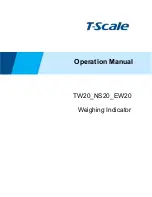
Installation, Operation and Service Manual
LKP Series
© 2016 DynAmp, LLC
Page 29
041749 K
6.12 ACCURACY DIAGNOSTICS (OPTIONAL)
“ACCURACY DIAGNOSTICS” (AD) is a system that assures the user that most internal
circuits are operating properly and it is also a diagnostic tool. It is made up of a number of
circuits, monitoring conditions of many of the critical components, circuits, and connections
within the current monitoring system. The AD subsystem provides relay contacts for the
user to connect to his remote warning indicator. The AD diagnostic light emitting diodes on
each Metering Unit module indicates proper operation of associated circuits.
The AD indicates the feedback circuits are functioning properly and the system’s power
supplies are within specifications. More specifically, this indicates the following conditions
exist:
1.
All channels have a core magnetic flux null:
a.)
All components in the circuits appear to be operating normally.
b.)
Input fields are of the expected polarity.
c.)
Input magnetic flux appears balanced by feedback flux.
2.
Power supplies are operating within acceptable ranges.
a.)
Mains input power is on.
b.)
Hall plate sensor power supply output is correct.
With unidirectional LKP measurement systems, it is possible that the AD circuits will give a
warning indication when the system is operated at low rectifier current level, even though
all circuits and components are functioning properly. This warning at low levels is most
likely to occur if the metering system is associated with one of several rectifiers in the area.
The AD outputs indicate the present condition, having only a short time delay from an
instantaneous condition. Although the AD does not monitor every possible error condition,
it is an effective means, giving the user continual assurance of signal reliability.
A.)
If the “Diagnostics Relay” is O.K. and the green LED indicators are all on: Continue
operating normally.
B.)
If the “Diagnostics Relay” indicates a warning and one or more green indicators are
off:
This indicates there may be measurement errors. Consequently, the metering system
should not be in full, automatic control of the rectifier. The AD relay contact output is
not intended to be the only monitor protecting the power rectifiers. It is expected that
the customer wants to take immediate action to prevent unsafe operation. Unsafe
operation could result if the metering system is in the rectifier control loop and it
erroneously produces a significantly lower output than is true. This might cause the
rectifier control circuit to inappropriately increase the power output, perhaps to
overload levels for either the power supply or the process. If the metering system is in
the control loop and the “Accuracy Diagnostics” indicates a potential problem, the
following actions are recommended: FIRST- Lock out control actions that could drive
the rectifier output higher and SECOND-alert the operator.
Basically, each module inside the Metering Unit has 4 channel LEDs and two power supply
monitoring LEDs. The following is a description of their functionality:











































